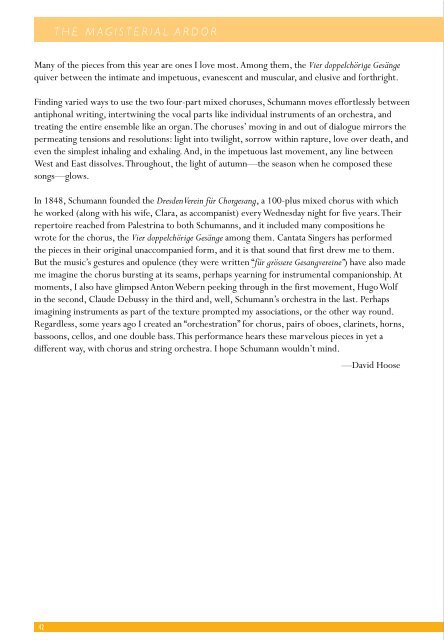You also want an ePaper? Increase the reach of your titles
YUMPU automatically turns print PDFs into web optimized ePapers that Google loves.
<strong>the</strong> magisterial ardor<br />
Many of <strong>the</strong> pieces from this year are <strong>on</strong>es I love most. Am<strong>on</strong>g <strong>the</strong>m, <strong>the</strong> Vier doppelchörige Gesänge<br />
quiver between <strong>the</strong> intimate and impetuous, evanescent and muscular, and elusive and forthright.<br />
Finding varied ways to use <strong>the</strong> two four-part mixed choruses, Schumann moves effortlessly between<br />
antiph<strong>on</strong>al writing, intertwining <strong>the</strong> vocal parts like individual instruments of an orchestra, and<br />
treating <strong>the</strong> entire ensemble like an organ. The choruses’ moving in and out of dialogue mirrors <strong>the</strong><br />
permeating tensi<strong>on</strong>s and resoluti<strong>on</strong>s: light into twilight, sorrow within rapture, love over death, and<br />
even <strong>the</strong> simplest inhaling and exhaling. And, in <strong>the</strong> impetuous last movement, any line between<br />
West and East dissolves. Throughout, <strong>the</strong> light of autumn—<strong>the</strong> seas<strong>on</strong> when he composed <strong>the</strong>se<br />
s<strong>on</strong>gs—glows.<br />
In 1848, Schumann founded <strong>the</strong> Dresden Verein für Chorgesang, a 100-plus mixed chorus with which<br />
he worked (al<strong>on</strong>g with his wife, Clara, as accompanist) every Wednesday night for five years. Their<br />
repertoire reached from Palestrina to both Schumanns, and it included many compositi<strong>on</strong>s he<br />
wrote for <strong>the</strong> chorus, <strong>the</strong> Vier doppelchörige Gesänge am<strong>on</strong>g <strong>the</strong>m. <strong>Cantata</strong> <strong>Singers</strong> has performed<br />
<strong>the</strong> pieces in <strong>the</strong>ir original unaccompanied form, and it is that sound that first drew me to <strong>the</strong>m.<br />
But <strong>the</strong> music’s gestures and opulence (<strong>the</strong>y were written “für grössere Gesangvereine”) have also made<br />
me imagine <strong>the</strong> chorus bursting at its seams, perhaps yearning for instrumental compani<strong>on</strong>ship. At<br />
moments, I also have glimpsed Ant<strong>on</strong> Webern peeking through in <strong>the</strong> first movement, Hugo Wolf<br />
in <strong>the</strong> sec<strong>on</strong>d, Claude Debussy in <strong>the</strong> third and, well, Schumann’s orchestra in <strong>the</strong> last. Perhaps<br />
imagining instruments as part of <strong>the</strong> texture prompted my associati<strong>on</strong>s, or <strong>the</strong> o<strong>the</strong>r way round.<br />
Regardless, some years ago I created an “orchestrati<strong>on</strong>” for chorus, pairs of oboes, clarinets, horns,<br />
basso<strong>on</strong>s, cellos, and <strong>on</strong>e double bass. This performance hears <strong>the</strong>se marvelous pieces in yet a<br />
different way, with chorus and string orchestra. I hope Schumann wouldn’t mind.<br />
—David Hoose<br />
Marjorie Merryman: Beauty, Grief and Grandeur<br />
Poems by Gerard Manly Hopkins<br />
Pied Beauty<br />
Glory be to God for dappled things –<br />
For skies of couple-colour as a brinded cow;<br />
For rose-moles all in stipple up<strong>on</strong> trout that swim;<br />
Fresh fire-coal chestnut-falls; finches’ wings;<br />
Landscape plotted and piece – fold, fallow, and plough;<br />
And all trades, <strong>the</strong>ir gear and tackle and trim.<br />
All things counter, original, spare, strange;<br />
Whatever is fickle, freckled (who knows how?)<br />
With swift, slow; sweet, sour; adazzle, dim;<br />
he fa<strong>the</strong>rs forth whose beauty is past change:<br />
Praise him.<br />
Spring and Fall<br />
Margaret, are you grieving<br />
Over Goldengrove unleaving?<br />
Leaves, like <strong>the</strong> things of man, you<br />
With your fresh thoughts care for, can you?<br />
Ah! As <strong>the</strong> heart grows older<br />
It will come to such sights colder<br />
By and by, nor spare a sigh<br />
though worlds of wanwood leafmeal lie;<br />
And yet you will weep and know why.<br />
Now, no matter, child, <strong>the</strong> name:<br />
Sorrow’s springs are <strong>the</strong> same.<br />
Nor mouth had, no nor mind, expressed<br />
What <strong>the</strong> heart heard of, ghost guessed:<br />
It is <strong>the</strong> blight man was born for,<br />
It is Margaret you mourn for.<br />
God’s Grandeur<br />
<strong>the</strong> world is charged with <strong>the</strong> grandeur of God.<br />
It will flame out, like shining from shook foil;<br />
It ga<strong>the</strong>rs to a greatness like <strong>the</strong> ooze of oil<br />
Crushed.Why do men not now <strong>the</strong>n reck his rod?<br />
Generati<strong>on</strong>s have trod, have trod, have trod;<br />
And all is seared with trade; bleared, smeared with toil;<br />
And wears man’s smudge and bears man’s smell: <strong>the</strong> soil<br />
Is bare now, nor can foot feel, being shod.<br />
And for all this, nature is never spent;<br />
<strong>the</strong>re lives <strong>the</strong> dearest freshness deep down things;<br />
And though <strong>the</strong> last lights off <strong>the</strong> black West went<br />
Oh, morning, at <strong>the</strong> brown brink eastward, springs –<br />
Because <strong>the</strong> holy Ghost over <strong>the</strong> bent<br />
World broods with warm breast and with ah! bright wings<br />
teXts aNd traNslatioNs<br />
42 43


